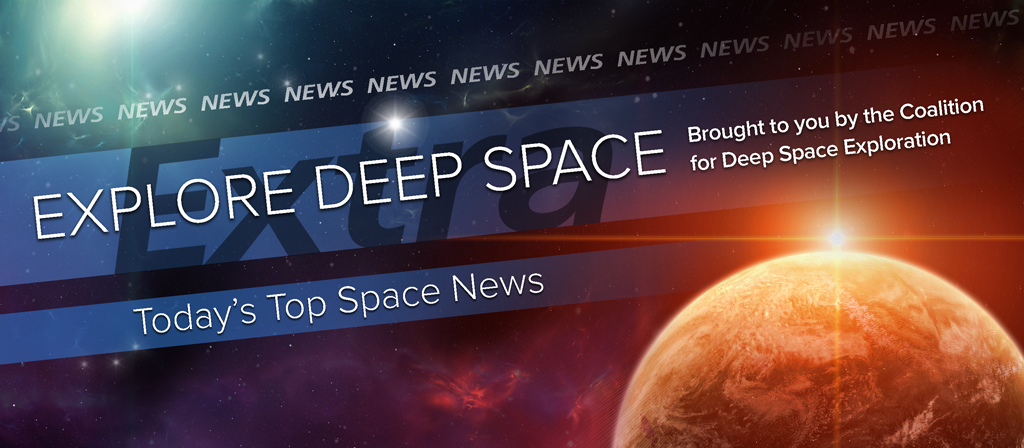Today’s Deep Space Extra offers the latest reporting and commentary on space related activities from across the globe. The FAA’s George Nield offers some reasons to embrace Moon Village, a proposed far side moon settlement. Multi-national studies examine the impacts of sustained weightlessness on the human brain. Nobelist John Mather reminds astronomers the far sighted James Webb Telescope is versatile enough to study objects as close as Mars. Scientists say the Martian moon Phobos may be slowly breaking apart. NASA’s Dawn spacecraft moves closer to the giant asteroid Ceres. Just a few weeks ago, astronomers discovered the most distant object yet in the solar system. The U.S. Senate adopts compromise commercial space legislation that would extend operations aboard the International Space Station from 2020 to 2024. Europe’s Ariane 5 successfully launched Saudi Arabian and Indian communications satellites from French Guiana on Tuesday. Intelsat selects Russia’s Proton for a lengthy satellite launch agreement.
Human Deep Space Exploration
Op-ed | Getting serious about Moon Village
Space News (11/10): Moon Village, a concept for a human settlement on the moon’s far side proposed by the European Space Agency director general Johann-Dietrich Woerner, has the support of the FAA’s George Nield, the agency’s associate administrator for commercial space transportation. “What appeals to me about that kind of a vision is that it minimizes the requirement for a very prescriptive, top-down management structure with one country specifying the architecture and calling all of the shots,” writes Nield in an op-ed. “Instead, it would enable countries to participate as much or as little as they chose, based on their capabilities and their interests.”
Space missions have major effects on astronauts’ brains
Huffington Post (11/10): Multinational research efforts planned through 2018 are identifying some of the major challenges the human brain faces as it adapts to weightlessness. Findings so far from NASA suggest the brain structure changes the way astronauts think. Astronauts have a more difficult time completing mental tasks and with physical coordination during and after spending time aboard the ISS, according to findings from a NASA sponsored study. A European and Russian space agency study suggests the brain’s cortex reorganizes itself in space to adapt.
Unmanned Deep Space Exploration
JWST’s top astronomer to planetary scientists: Start your engines
Space News (11/10): The James Webb Space Telescope, which is the Hubble Space Telescope’s designated successor, promises to improve observations and understanding of near astronomical objects, according to John Mather, of NASA, the JWST’s Nobel Prize winning top program scientist from the Goddard Space Flight Center. The near $9 billion deep space observatory was developed primarily for studies of the frontiers of the universe. Mars may be a suitable nearby target, suggests Mather, who spoke before the annual meeting of the American Astronomical Society’s Division of Planetary Sciences. Launch of the JWST is planned for October 2018.
Mars’ Moon Phobos undergoing ‘structural failure’
Universe Today (11/10): Scientists say structural cracks in the Martian moon Phobos are a result of tidal stresses that could lead to the moon’s breakup in 30 to 50 million years. The findings were presented at the annual meeting of the American Astronomical Society’s division of planetary sciences.
Ceres delights: Dawn’s latest dwarf planet views
Discovery News (11/11): NASA’s Dawn spacecraft has offered new close up perspectives on the large asteroid Ceres as the probe gradually descends from an orbit 915 miles above the cratered surface to one just 235 miles above the alien terrain by mid-December.
Most distant solar system object yet could hint at hidden planet
New Scientist (11/10): Discovered in October 2015, the distant object designated V774104 is about half the size of Pluto. The discovery was previewed at the annual meeting of the American Astronomical Society’s division of planetary sciences this week.
Commercial to Low Earth Orbit
Senate passes compromise commercial space bill
Spacepolicyonline.com (11/10): The U.S. Senate passed compromise commercial space legislation on Tuesday. One major provision extends operations of the International Space Station from 2020 to 2024. So far, Russia and Canada are supportive of the extension. Other provisions of the measure extend a learning period, or regulatory hiatus, for U.S. commercial space interests from March 31, 2016 through Sept. 30, 2023; establish a legal right to resources found on asteroids by U.S. citizens; and establish policy supporting the use of NASA’s Space Launch System exploration rocket for payloads other than astronauts to explore deep space.
Ariane 5 successfully launches Arabsat-6B and GSAT-15
NASAspaceflight.com (11/10): A European Ariane 5 rocket launched two communications satellites from Kourou, French Guiana on Tuesday, Arabsat-6B for Saudi Arabia and GSAT-15 for India.
Russia’s ILS signs contract with Intelsat on five Proton-M launches until 2023
TASS, of Russia (11/10): Russia’s International Launch Services has signed a contract with Intelsat for five launches of communications satellites using the Proton launch vehicle from the Baikonur Cosmodrome in Kazakhstan.

